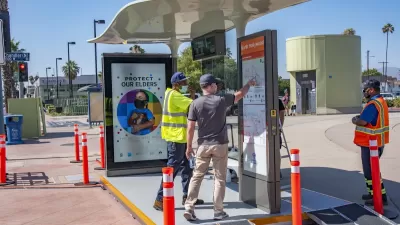Many U.S. transit agencies have policies allowing riders to request dropoffs between stops, but fail to publicize them to passengers and operators.

If you’ve ever wished you could ask your bus driver to let you off between stops, it turns out you probably can. According to an article in Next City by H. Jiahong Pan, many U.S. transit agencies have a “request stops” policy that allows riders to ask to disembark between designated stops “within reason.” Request stops can make travel safer and more accessible by letting people exit the bus closer to their destination or in places with better lighting or pedestrian infrastructure.
However, few riders, or even drivers, know about the policies, even though some date back as far as the early 1970s. “Although studies have shown the policy helps female riders who feel uncomfortable walking long distances at night alone, transit agencies struggle to get the word out and develop clear, consistent policies.”
While agencies are working to clarify these policies for operators and riders, some also ban request stops on rapid transit lines, saying that adding stops would increase travel times. Agencies also have a variety of rules for where drivers can drop off passengers, such as only stopping at corners before an intersection or banning dropoffs next to highways.
FULL STORY: An Obscure Rule About Bus Stops Can Make Riding At Night Safer

Maui's Vacation Rental Debate Turns Ugly
Verbal attacks, misinformation campaigns and fistfights plague a high-stakes debate to convert thousands of vacation rentals into long-term housing.

Planetizen Federal Action Tracker
A weekly monitor of how Trump’s orders and actions are impacting planners and planning in America.

In Urban Planning, AI Prompting Could be the New Design Thinking
Creativity has long been key to great urban design. What if we see AI as our new creative partner?

King County Supportive Housing Program Offers Hope for Unhoused Residents
The county is taking a ‘Housing First’ approach that prioritizes getting people into housing, then offering wraparound supportive services.

Researchers Use AI to Get Clearer Picture of US Housing
Analysts are using artificial intelligence to supercharge their research by allowing them to comb through data faster. Though these AI tools can be error prone, they save time and housing researchers are optimistic about the future.

Making Shared Micromobility More Inclusive
Cities and shared mobility system operators can do more to include people with disabilities in planning and operations, per a new report.
Urban Design for Planners 1: Software Tools
This six-course series explores essential urban design concepts using open source software and equips planners with the tools they need to participate fully in the urban design process.
Planning for Universal Design
Learn the tools for implementing Universal Design in planning regulations.
planning NEXT
Appalachian Highlands Housing Partners
Mpact (founded as Rail~Volution)
City of Camden Redevelopment Agency
City of Astoria
City of Portland
City of Laramie





























